Case Study: Governance in Globalizing World - Volkswagen Scandal
VerifiedAdded on 2023/06/11
|9
|2075
|454
Case Study
AI Summary
This case study examines the Volkswagen scandal through the framework of corporate governance, focusing on the roles and responsibilities of the CEO and the Supervisory Board. It discusses the applicability of agency and stewardship theories, highlighting the importance of accountability, transparency, and stakeholder engagement in preventing corporate malfeasance. The analysis explores the corporate governance issues at Volkswagen, including the composition of the management board, loss of shareholder trust, and lack of accountability among supervisory board members, suggesting ways the company could have avoided the scandal by adhering to principles of Corporate Social Responsibility and ethical leadership. Desklib provides students access to similar solved assignments and resources to enhance their understanding of corporate governance principles.
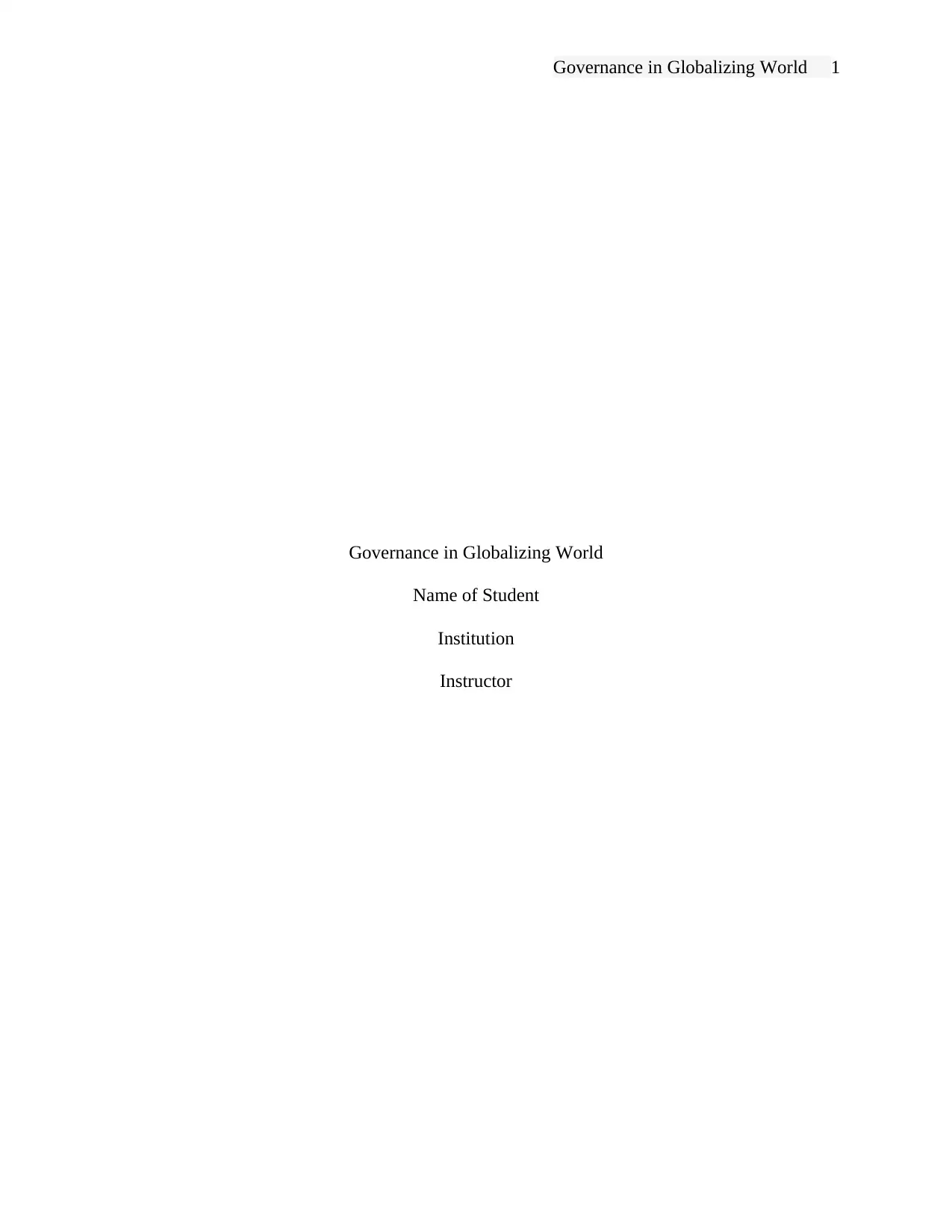
Governance in Globalizing World 1
Governance in Globalizing World
Name of Student
Institution
Instructor
Governance in Globalizing World
Name of Student
Institution
Instructor
Paraphrase This Document
Need a fresh take? Get an instant paraphrase of this document with our AI Paraphraser
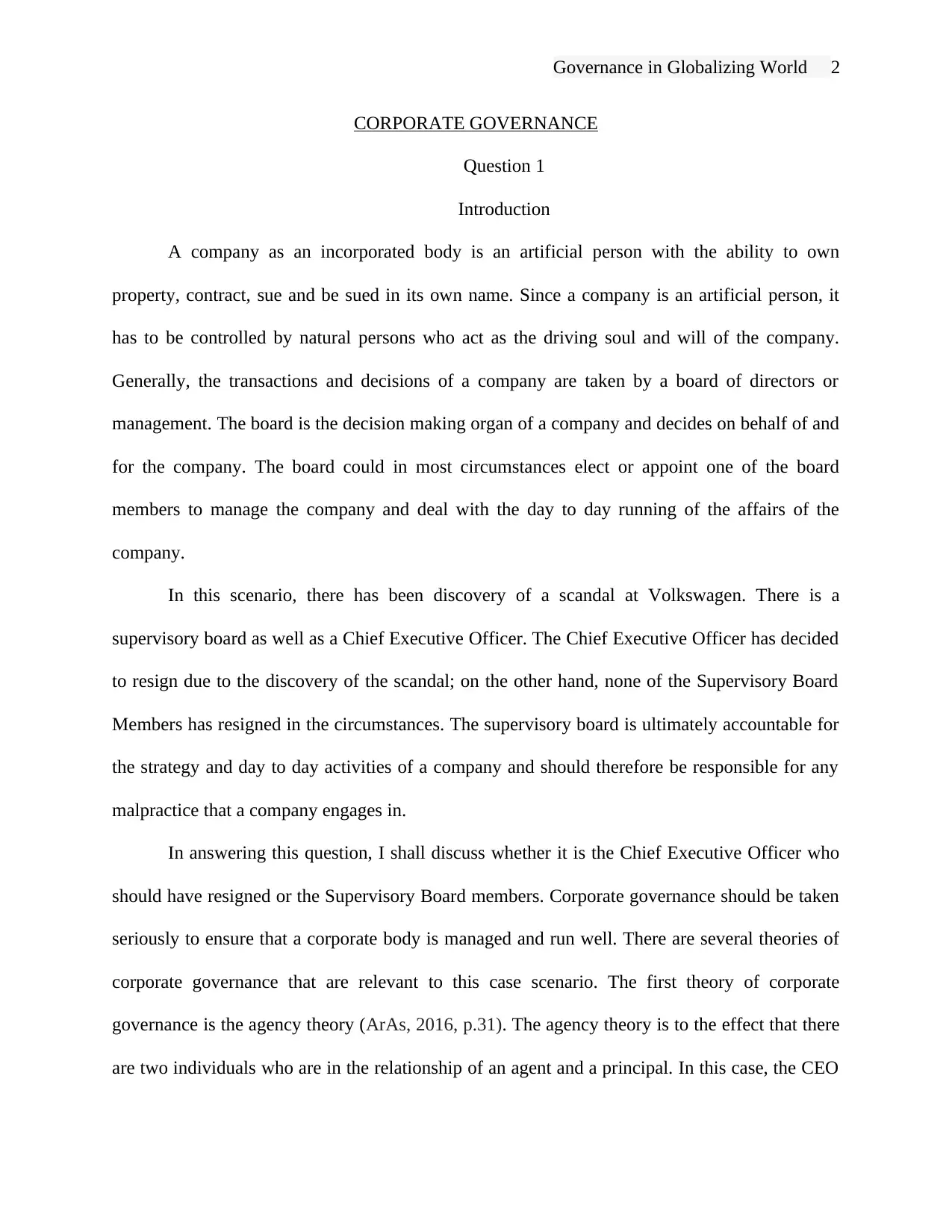
Governance in Globalizing World 2
CORPORATE GOVERNANCE
Question 1
Introduction
A company as an incorporated body is an artificial person with the ability to own
property, contract, sue and be sued in its own name. Since a company is an artificial person, it
has to be controlled by natural persons who act as the driving soul and will of the company.
Generally, the transactions and decisions of a company are taken by a board of directors or
management. The board is the decision making organ of a company and decides on behalf of and
for the company. The board could in most circumstances elect or appoint one of the board
members to manage the company and deal with the day to day running of the affairs of the
company.
In this scenario, there has been discovery of a scandal at Volkswagen. There is a
supervisory board as well as a Chief Executive Officer. The Chief Executive Officer has decided
to resign due to the discovery of the scandal; on the other hand, none of the Supervisory Board
Members has resigned in the circumstances. The supervisory board is ultimately accountable for
the strategy and day to day activities of a company and should therefore be responsible for any
malpractice that a company engages in.
In answering this question, I shall discuss whether it is the Chief Executive Officer who
should have resigned or the Supervisory Board members. Corporate governance should be taken
seriously to ensure that a corporate body is managed and run well. There are several theories of
corporate governance that are relevant to this case scenario. The first theory of corporate
governance is the agency theory (ArAs, 2016, p.31). The agency theory is to the effect that there
are two individuals who are in the relationship of an agent and a principal. In this case, the CEO
CORPORATE GOVERNANCE
Question 1
Introduction
A company as an incorporated body is an artificial person with the ability to own
property, contract, sue and be sued in its own name. Since a company is an artificial person, it
has to be controlled by natural persons who act as the driving soul and will of the company.
Generally, the transactions and decisions of a company are taken by a board of directors or
management. The board is the decision making organ of a company and decides on behalf of and
for the company. The board could in most circumstances elect or appoint one of the board
members to manage the company and deal with the day to day running of the affairs of the
company.
In this scenario, there has been discovery of a scandal at Volkswagen. There is a
supervisory board as well as a Chief Executive Officer. The Chief Executive Officer has decided
to resign due to the discovery of the scandal; on the other hand, none of the Supervisory Board
Members has resigned in the circumstances. The supervisory board is ultimately accountable for
the strategy and day to day activities of a company and should therefore be responsible for any
malpractice that a company engages in.
In answering this question, I shall discuss whether it is the Chief Executive Officer who
should have resigned or the Supervisory Board members. Corporate governance should be taken
seriously to ensure that a corporate body is managed and run well. There are several theories of
corporate governance that are relevant to this case scenario. The first theory of corporate
governance is the agency theory (ArAs, 2016, p.31). The agency theory is to the effect that there
are two individuals who are in the relationship of an agent and a principal. In this case, the CEO
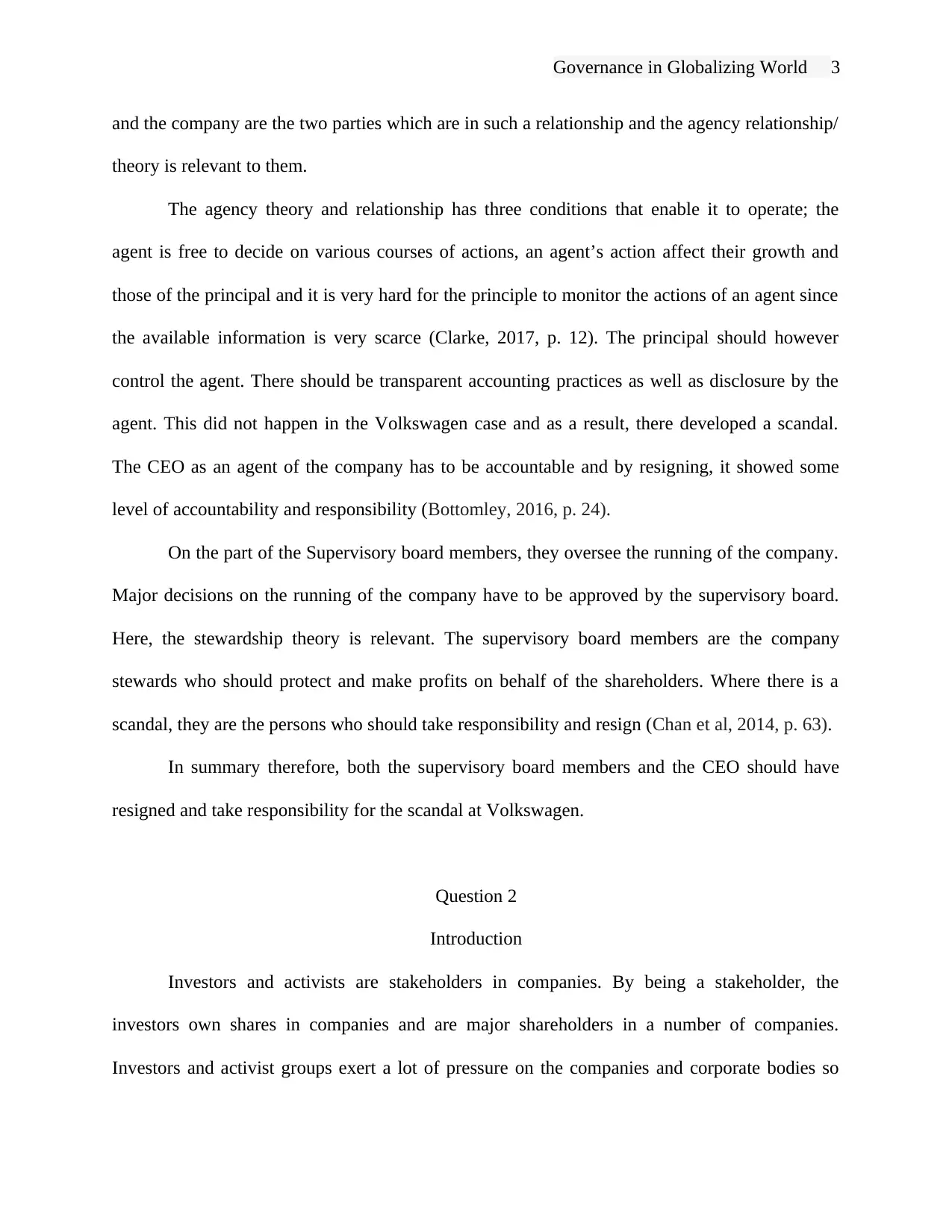
Governance in Globalizing World 3
and the company are the two parties which are in such a relationship and the agency relationship/
theory is relevant to them.
The agency theory and relationship has three conditions that enable it to operate; the
agent is free to decide on various courses of actions, an agent’s action affect their growth and
those of the principal and it is very hard for the principle to monitor the actions of an agent since
the available information is very scarce (Clarke, 2017, p. 12). The principal should however
control the agent. There should be transparent accounting practices as well as disclosure by the
agent. This did not happen in the Volkswagen case and as a result, there developed a scandal.
The CEO as an agent of the company has to be accountable and by resigning, it showed some
level of accountability and responsibility (Bottomley, 2016, p. 24).
On the part of the Supervisory board members, they oversee the running of the company.
Major decisions on the running of the company have to be approved by the supervisory board.
Here, the stewardship theory is relevant. The supervisory board members are the company
stewards who should protect and make profits on behalf of the shareholders. Where there is a
scandal, they are the persons who should take responsibility and resign (Chan et al, 2014, p. 63).
In summary therefore, both the supervisory board members and the CEO should have
resigned and take responsibility for the scandal at Volkswagen.
Question 2
Introduction
Investors and activists are stakeholders in companies. By being a stakeholder, the
investors own shares in companies and are major shareholders in a number of companies.
Investors and activist groups exert a lot of pressure on the companies and corporate bodies so
and the company are the two parties which are in such a relationship and the agency relationship/
theory is relevant to them.
The agency theory and relationship has three conditions that enable it to operate; the
agent is free to decide on various courses of actions, an agent’s action affect their growth and
those of the principal and it is very hard for the principle to monitor the actions of an agent since
the available information is very scarce (Clarke, 2017, p. 12). The principal should however
control the agent. There should be transparent accounting practices as well as disclosure by the
agent. This did not happen in the Volkswagen case and as a result, there developed a scandal.
The CEO as an agent of the company has to be accountable and by resigning, it showed some
level of accountability and responsibility (Bottomley, 2016, p. 24).
On the part of the Supervisory board members, they oversee the running of the company.
Major decisions on the running of the company have to be approved by the supervisory board.
Here, the stewardship theory is relevant. The supervisory board members are the company
stewards who should protect and make profits on behalf of the shareholders. Where there is a
scandal, they are the persons who should take responsibility and resign (Chan et al, 2014, p. 63).
In summary therefore, both the supervisory board members and the CEO should have
resigned and take responsibility for the scandal at Volkswagen.
Question 2
Introduction
Investors and activists are stakeholders in companies. By being a stakeholder, the
investors own shares in companies and are major shareholders in a number of companies.
Investors and activist groups exert a lot of pressure on the companies and corporate bodies so
⊘ This is a preview!⊘
Do you want full access?
Subscribe today to unlock all pages.

Trusted by 1+ million students worldwide
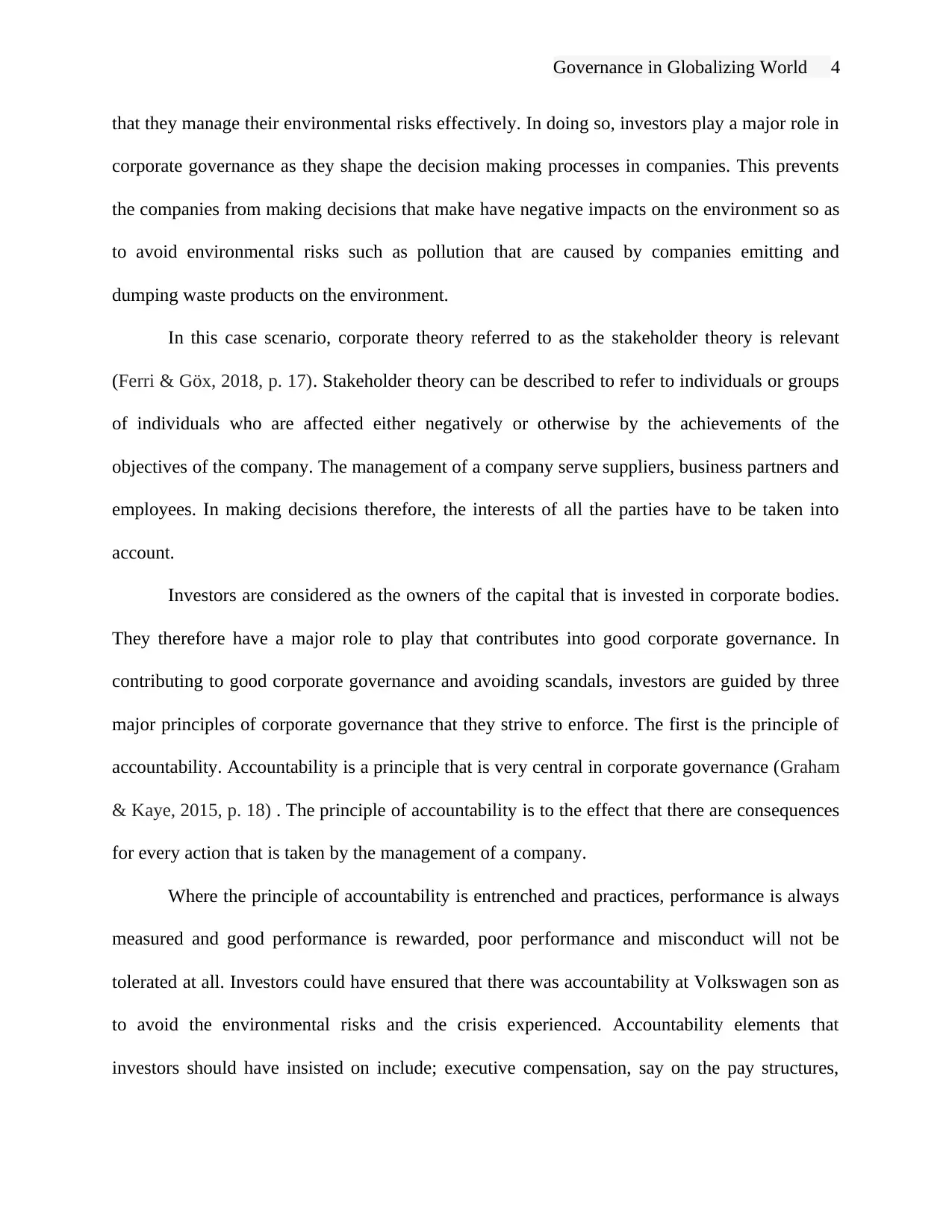
Governance in Globalizing World 4
that they manage their environmental risks effectively. In doing so, investors play a major role in
corporate governance as they shape the decision making processes in companies. This prevents
the companies from making decisions that make have negative impacts on the environment so as
to avoid environmental risks such as pollution that are caused by companies emitting and
dumping waste products on the environment.
In this case scenario, corporate theory referred to as the stakeholder theory is relevant
(Ferri & Göx, 2018, p. 17). Stakeholder theory can be described to refer to individuals or groups
of individuals who are affected either negatively or otherwise by the achievements of the
objectives of the company. The management of a company serve suppliers, business partners and
employees. In making decisions therefore, the interests of all the parties have to be taken into
account.
Investors are considered as the owners of the capital that is invested in corporate bodies.
They therefore have a major role to play that contributes into good corporate governance. In
contributing to good corporate governance and avoiding scandals, investors are guided by three
major principles of corporate governance that they strive to enforce. The first is the principle of
accountability. Accountability is a principle that is very central in corporate governance (Graham
& Kaye, 2015, p. 18) . The principle of accountability is to the effect that there are consequences
for every action that is taken by the management of a company.
Where the principle of accountability is entrenched and practices, performance is always
measured and good performance is rewarded, poor performance and misconduct will not be
tolerated at all. Investors could have ensured that there was accountability at Volkswagen son as
to avoid the environmental risks and the crisis experienced. Accountability elements that
investors should have insisted on include; executive compensation, say on the pay structures,
that they manage their environmental risks effectively. In doing so, investors play a major role in
corporate governance as they shape the decision making processes in companies. This prevents
the companies from making decisions that make have negative impacts on the environment so as
to avoid environmental risks such as pollution that are caused by companies emitting and
dumping waste products on the environment.
In this case scenario, corporate theory referred to as the stakeholder theory is relevant
(Ferri & Göx, 2018, p. 17). Stakeholder theory can be described to refer to individuals or groups
of individuals who are affected either negatively or otherwise by the achievements of the
objectives of the company. The management of a company serve suppliers, business partners and
employees. In making decisions therefore, the interests of all the parties have to be taken into
account.
Investors are considered as the owners of the capital that is invested in corporate bodies.
They therefore have a major role to play that contributes into good corporate governance. In
contributing to good corporate governance and avoiding scandals, investors are guided by three
major principles of corporate governance that they strive to enforce. The first is the principle of
accountability. Accountability is a principle that is very central in corporate governance (Graham
& Kaye, 2015, p. 18) . The principle of accountability is to the effect that there are consequences
for every action that is taken by the management of a company.
Where the principle of accountability is entrenched and practices, performance is always
measured and good performance is rewarded, poor performance and misconduct will not be
tolerated at all. Investors could have ensured that there was accountability at Volkswagen son as
to avoid the environmental risks and the crisis experienced. Accountability elements that
investors should have insisted on include; executive compensation, say on the pay structures,
Paraphrase This Document
Need a fresh take? Get an instant paraphrase of this document with our AI Paraphraser
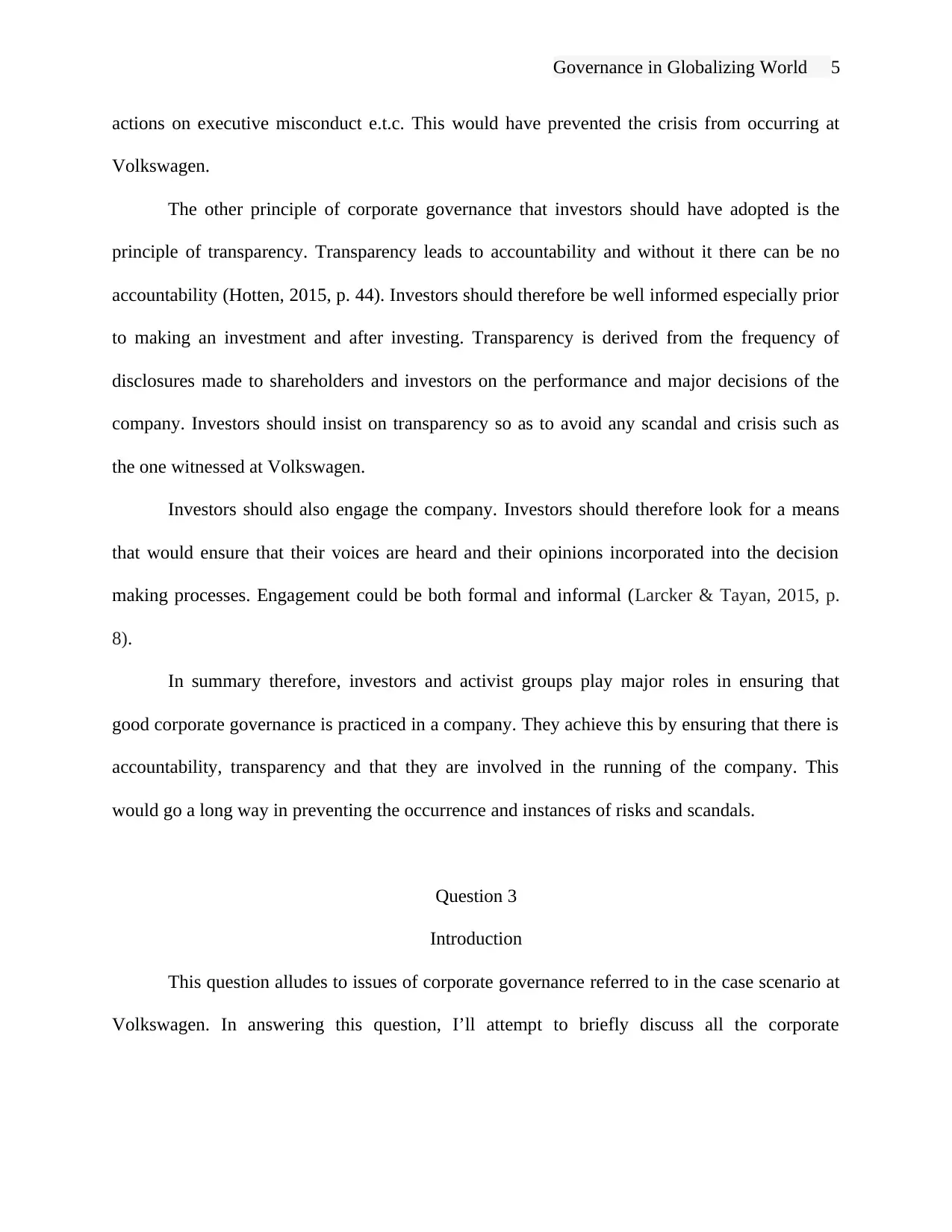
Governance in Globalizing World 5
actions on executive misconduct e.t.c. This would have prevented the crisis from occurring at
Volkswagen.
The other principle of corporate governance that investors should have adopted is the
principle of transparency. Transparency leads to accountability and without it there can be no
accountability (Hotten, 2015, p. 44). Investors should therefore be well informed especially prior
to making an investment and after investing. Transparency is derived from the frequency of
disclosures made to shareholders and investors on the performance and major decisions of the
company. Investors should insist on transparency so as to avoid any scandal and crisis such as
the one witnessed at Volkswagen.
Investors should also engage the company. Investors should therefore look for a means
that would ensure that their voices are heard and their opinions incorporated into the decision
making processes. Engagement could be both formal and informal (Larcker & Tayan, 2015, p.
8).
In summary therefore, investors and activist groups play major roles in ensuring that
good corporate governance is practiced in a company. They achieve this by ensuring that there is
accountability, transparency and that they are involved in the running of the company. This
would go a long way in preventing the occurrence and instances of risks and scandals.
Question 3
Introduction
This question alludes to issues of corporate governance referred to in the case scenario at
Volkswagen. In answering this question, I’ll attempt to briefly discuss all the corporate
actions on executive misconduct e.t.c. This would have prevented the crisis from occurring at
Volkswagen.
The other principle of corporate governance that investors should have adopted is the
principle of transparency. Transparency leads to accountability and without it there can be no
accountability (Hotten, 2015, p. 44). Investors should therefore be well informed especially prior
to making an investment and after investing. Transparency is derived from the frequency of
disclosures made to shareholders and investors on the performance and major decisions of the
company. Investors should insist on transparency so as to avoid any scandal and crisis such as
the one witnessed at Volkswagen.
Investors should also engage the company. Investors should therefore look for a means
that would ensure that their voices are heard and their opinions incorporated into the decision
making processes. Engagement could be both formal and informal (Larcker & Tayan, 2015, p.
8).
In summary therefore, investors and activist groups play major roles in ensuring that
good corporate governance is practiced in a company. They achieve this by ensuring that there is
accountability, transparency and that they are involved in the running of the company. This
would go a long way in preventing the occurrence and instances of risks and scandals.
Question 3
Introduction
This question alludes to issues of corporate governance referred to in the case scenario at
Volkswagen. In answering this question, I’ll attempt to briefly discuss all the corporate
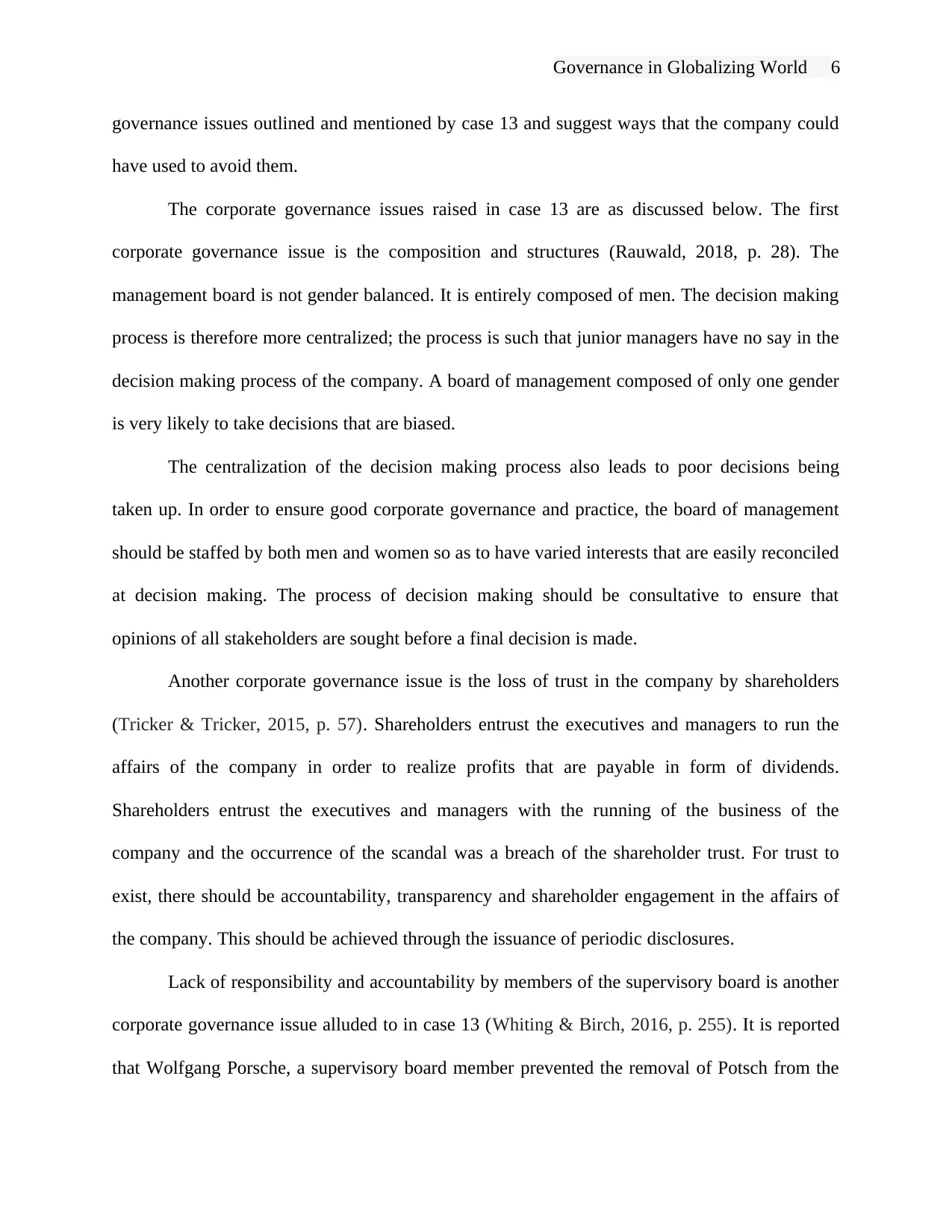
Governance in Globalizing World 6
governance issues outlined and mentioned by case 13 and suggest ways that the company could
have used to avoid them.
The corporate governance issues raised in case 13 are as discussed below. The first
corporate governance issue is the composition and structures (Rauwald, 2018, p. 28). The
management board is not gender balanced. It is entirely composed of men. The decision making
process is therefore more centralized; the process is such that junior managers have no say in the
decision making process of the company. A board of management composed of only one gender
is very likely to take decisions that are biased.
The centralization of the decision making process also leads to poor decisions being
taken up. In order to ensure good corporate governance and practice, the board of management
should be staffed by both men and women so as to have varied interests that are easily reconciled
at decision making. The process of decision making should be consultative to ensure that
opinions of all stakeholders are sought before a final decision is made.
Another corporate governance issue is the loss of trust in the company by shareholders
(Tricker & Tricker, 2015, p. 57). Shareholders entrust the executives and managers to run the
affairs of the company in order to realize profits that are payable in form of dividends.
Shareholders entrust the executives and managers with the running of the business of the
company and the occurrence of the scandal was a breach of the shareholder trust. For trust to
exist, there should be accountability, transparency and shareholder engagement in the affairs of
the company. This should be achieved through the issuance of periodic disclosures.
Lack of responsibility and accountability by members of the supervisory board is another
corporate governance issue alluded to in case 13 (Whiting & Birch, 2016, p. 255). It is reported
that Wolfgang Porsche, a supervisory board member prevented the removal of Potsch from the
governance issues outlined and mentioned by case 13 and suggest ways that the company could
have used to avoid them.
The corporate governance issues raised in case 13 are as discussed below. The first
corporate governance issue is the composition and structures (Rauwald, 2018, p. 28). The
management board is not gender balanced. It is entirely composed of men. The decision making
process is therefore more centralized; the process is such that junior managers have no say in the
decision making process of the company. A board of management composed of only one gender
is very likely to take decisions that are biased.
The centralization of the decision making process also leads to poor decisions being
taken up. In order to ensure good corporate governance and practice, the board of management
should be staffed by both men and women so as to have varied interests that are easily reconciled
at decision making. The process of decision making should be consultative to ensure that
opinions of all stakeholders are sought before a final decision is made.
Another corporate governance issue is the loss of trust in the company by shareholders
(Tricker & Tricker, 2015, p. 57). Shareholders entrust the executives and managers to run the
affairs of the company in order to realize profits that are payable in form of dividends.
Shareholders entrust the executives and managers with the running of the business of the
company and the occurrence of the scandal was a breach of the shareholder trust. For trust to
exist, there should be accountability, transparency and shareholder engagement in the affairs of
the company. This should be achieved through the issuance of periodic disclosures.
Lack of responsibility and accountability by members of the supervisory board is another
corporate governance issue alluded to in case 13 (Whiting & Birch, 2016, p. 255). It is reported
that Wolfgang Porsche, a supervisory board member prevented the removal of Potsch from the
⊘ This is a preview!⊘
Do you want full access?
Subscribe today to unlock all pages.

Trusted by 1+ million students worldwide
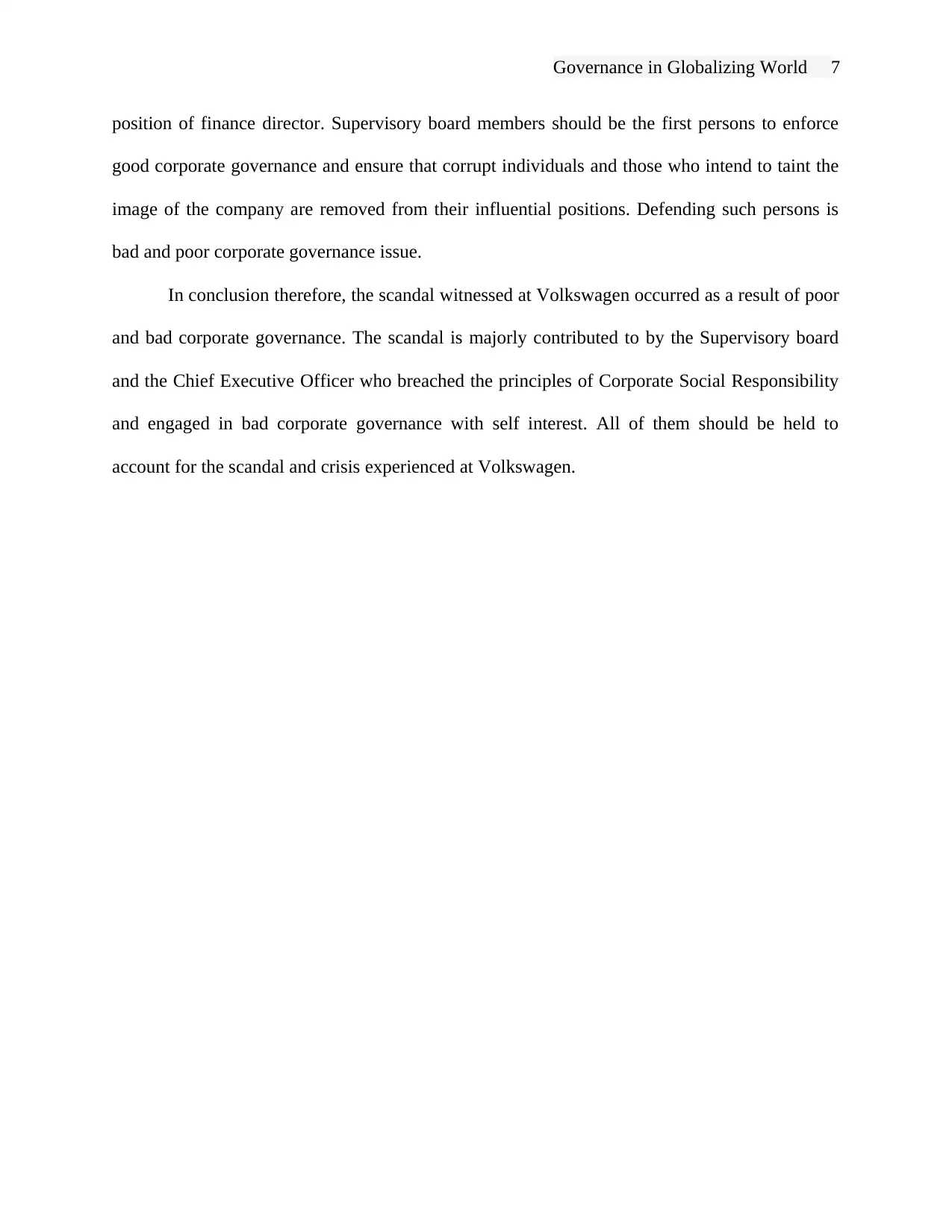
Governance in Globalizing World 7
position of finance director. Supervisory board members should be the first persons to enforce
good corporate governance and ensure that corrupt individuals and those who intend to taint the
image of the company are removed from their influential positions. Defending such persons is
bad and poor corporate governance issue.
In conclusion therefore, the scandal witnessed at Volkswagen occurred as a result of poor
and bad corporate governance. The scandal is majorly contributed to by the Supervisory board
and the Chief Executive Officer who breached the principles of Corporate Social Responsibility
and engaged in bad corporate governance with self interest. All of them should be held to
account for the scandal and crisis experienced at Volkswagen.
position of finance director. Supervisory board members should be the first persons to enforce
good corporate governance and ensure that corrupt individuals and those who intend to taint the
image of the company are removed from their influential positions. Defending such persons is
bad and poor corporate governance issue.
In conclusion therefore, the scandal witnessed at Volkswagen occurred as a result of poor
and bad corporate governance. The scandal is majorly contributed to by the Supervisory board
and the Chief Executive Officer who breached the principles of Corporate Social Responsibility
and engaged in bad corporate governance with self interest. All of them should be held to
account for the scandal and crisis experienced at Volkswagen.
Paraphrase This Document
Need a fresh take? Get an instant paraphrase of this document with our AI Paraphraser
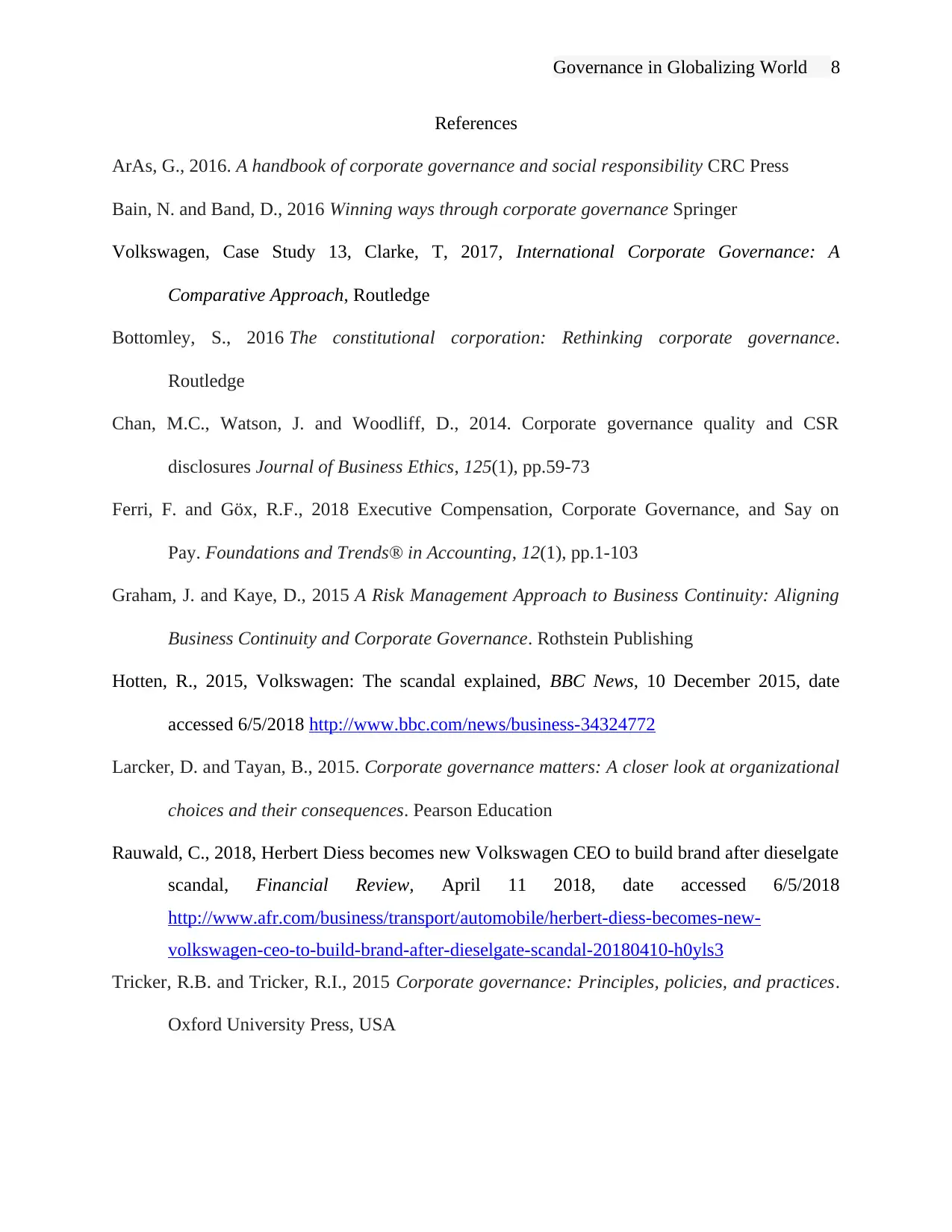
Governance in Globalizing World 8
References
ArAs, G., 2016. A handbook of corporate governance and social responsibility CRC Press
Bain, N. and Band, D., 2016 Winning ways through corporate governance Springer
Volkswagen, Case Study 13, Clarke, T, 2017, International Corporate Governance: A
Comparative Approach, Routledge
Bottomley, S., 2016 The constitutional corporation: Rethinking corporate governance.
Routledge
Chan, M.C., Watson, J. and Woodliff, D., 2014. Corporate governance quality and CSR
disclosures Journal of Business Ethics, 125(1), pp.59-73
Ferri, F. and Göx, R.F., 2018 Executive Compensation, Corporate Governance, and Say on
Pay. Foundations and Trends® in Accounting, 12(1), pp.1-103
Graham, J. and Kaye, D., 2015 A Risk Management Approach to Business Continuity: Aligning
Business Continuity and Corporate Governance. Rothstein Publishing
Hotten, R., 2015, Volkswagen: The scandal explained, BBC News, 10 December 2015, date
accessed 6/5/2018 http://www.bbc.com/news/business-34324772
Larcker, D. and Tayan, B., 2015. Corporate governance matters: A closer look at organizational
choices and their consequences. Pearson Education
Rauwald, C., 2018, Herbert Diess becomes new Volkswagen CEO to build brand after dieselgate
scandal, Financial Review, April 11 2018, date accessed 6/5/2018
http://www.afr.com/business/transport/automobile/herbert-diess-becomes-new-
volkswagen-ceo-to-build-brand-after-dieselgate-scandal-20180410-h0yls3
Tricker, R.B. and Tricker, R.I., 2015 Corporate governance: Principles, policies, and practices.
Oxford University Press, USA
References
ArAs, G., 2016. A handbook of corporate governance and social responsibility CRC Press
Bain, N. and Band, D., 2016 Winning ways through corporate governance Springer
Volkswagen, Case Study 13, Clarke, T, 2017, International Corporate Governance: A
Comparative Approach, Routledge
Bottomley, S., 2016 The constitutional corporation: Rethinking corporate governance.
Routledge
Chan, M.C., Watson, J. and Woodliff, D., 2014. Corporate governance quality and CSR
disclosures Journal of Business Ethics, 125(1), pp.59-73
Ferri, F. and Göx, R.F., 2018 Executive Compensation, Corporate Governance, and Say on
Pay. Foundations and Trends® in Accounting, 12(1), pp.1-103
Graham, J. and Kaye, D., 2015 A Risk Management Approach to Business Continuity: Aligning
Business Continuity and Corporate Governance. Rothstein Publishing
Hotten, R., 2015, Volkswagen: The scandal explained, BBC News, 10 December 2015, date
accessed 6/5/2018 http://www.bbc.com/news/business-34324772
Larcker, D. and Tayan, B., 2015. Corporate governance matters: A closer look at organizational
choices and their consequences. Pearson Education
Rauwald, C., 2018, Herbert Diess becomes new Volkswagen CEO to build brand after dieselgate
scandal, Financial Review, April 11 2018, date accessed 6/5/2018
http://www.afr.com/business/transport/automobile/herbert-diess-becomes-new-
volkswagen-ceo-to-build-brand-after-dieselgate-scandal-20180410-h0yls3
Tricker, R.B. and Tricker, R.I., 2015 Corporate governance: Principles, policies, and practices.
Oxford University Press, USA

Governance in Globalizing World 9
Whiting, R.H. and Birch, G.Y., 2016 Corporate governance and intellectual capital disclosure
Corporate Ownership and Control, 13, pp.250-260
Whiting, R.H. and Birch, G.Y., 2016 Corporate governance and intellectual capital disclosure
Corporate Ownership and Control, 13, pp.250-260
⊘ This is a preview!⊘
Do you want full access?
Subscribe today to unlock all pages.

Trusted by 1+ million students worldwide
1 out of 9
Related Documents
Your All-in-One AI-Powered Toolkit for Academic Success.
+13062052269
info@desklib.com
Available 24*7 on WhatsApp / Email
![[object Object]](/_next/static/media/star-bottom.7253800d.svg)
Unlock your academic potential
Copyright © 2020–2026 A2Z Services. All Rights Reserved. Developed and managed by ZUCOL.




